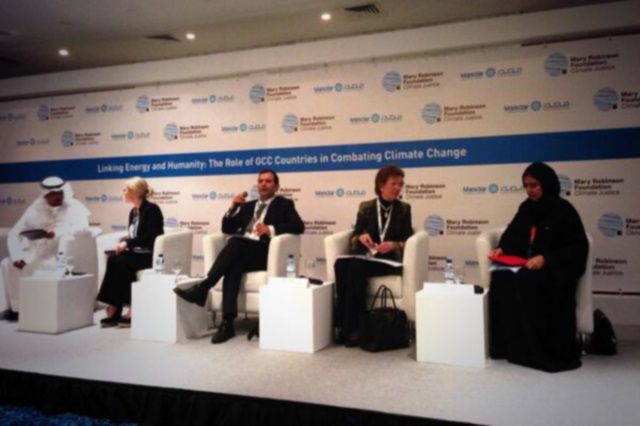Representatives of government, the private sector, and civil society took part in an event co-hosted by the Mary Robinson Foundation – Climate Justice and Masdar on 20 January 2014.
Representatives of government, the private sector, and civil society took part in an event co-hosted by the Mary Robinson Foundation – Climate Justice and Masdar on 20 January 2014.
‘Linking Energy and Humanity: The Role of the Gulf Cooperation Council (GCC) in Combating Climate Change’ provided an opportunity to engage participants at the Abu Dhabi Sustainability Week, the largest annual gathering on sustainability in the Middle East, in a discussion on the role of GCC countries in the transition to low-carbon economies.
The event was undertaken as part of the Climate Justice Dialogue, an initiative of the Mary Robinson Foundation – Climate Justice and the World Resources Institute.
The event was moderated by Rob Bradley from the Directorate of Energy and Climate Change, United Arab Emirates and the panellists were Mrs. Mary Robinson, President, Mary Robinson Foundation – Climate Justice, Dr. Behjat Al Yousef, Dean of Students, Masdar Institute for Science and Technology, Mr. Solaiman Al Rifai, Director of Project Finance, Dubai Carbon Centre of Excellence (DCCE) and Ms. Ida Tillisch, Director General, Emirates Wildlife Society – World Wild Fund for Nature (EWS-WWF).
Panellists focussed on opportunities and challenges facing GCC countries as they seek to combat climate change. Water shortages, the high costs associated with water desalination and the impacts of rising sea levels on coastal and marine life were among the challenges identified by Dr Yousef. Mr Al Rifai said that ‘the GCC needs to be ambitious, comprehensive and action orientated in tackling climate change’ specifying a need to move away from fossil fuel subsidies, to integrate water and energy strategies and to develop a comprehensive climate and energy policy framework that is inclusive and stakeholder driven. Ms. Tillisch highlighted the job opportunities that would come from a transition to a low-carbon economy and spoke of energy efficiency policies at household level that could be replicated elsewhere.
In a question and answer session that followed the panel discussion, the need to move away from a fossil fuel dependency was debated and the challenges that this posed for the GCC in terms of economic prosperity and development were underlined. Closing the event, Mrs. Robinson highlighted the inequities of climate change and the impacts that it is having on the poorest countries that have done least to cause it. She said that ‘transformative leadership on climate change has to come from regions with the capacity to act. The GCC is one such region with huge potential for transformative leadership.’


